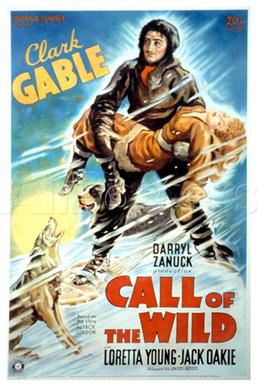Posts Tagged → ticket
One call I won’t take
Phony, fraudulent telemarketer calls are super annoying, and like you, I am fed up with them.
Another phony call just arrived, called “Call of the Wild,” a new movie loosely based on a Jack London book by the same name.
Jack London’s stories of tenuous life in the Yukon and Alaskan interiors are the stuff of pre-internet American boyhood. Just like coonskin Davey Crockett hats were all the rage among American boys in the 1950s and 1960s after Fess Parker starred in the same-named TV show, so too did London inspire many young men to get their forestry degree, build a canoe, cut down their grandmother’s favorite apple tree with a hatchet, or move to Alaska. His stories of nail-biting survival and creeping or sudden death in the boreal forests and frigid back country rang true, and a number of movies have been made about them. Some better than others, but all of them pretty good just because the story line is great.
London’s story about a young man caught at sundown in the winter time Alaskan bush, unprepared for the minus-forty-degree night, who gets down to his last match and finally succeeds at lighting a life-saving fire, only to have the snow from the branches above fall and smother the fire, is classic.
This latest iteration involves an unrealistic CGI human-like dog that giddy un-wilderness urbanites will fawn over. It also includes Harrison Ford, a man blessed with poor acting skills who nonetheless has landed a huge list of Hollywood roles and who made a huge pile of money. Play acting and playing dress-up; not exactly brain surgeon level or even bank teller level stuff.
And to be fair, Ford’s best movie roles are those that fit his kind of simple, bland, taciturn persona, like the Jack Ryan character, or Indiana Jones, or the emotion-less Blade Runner cyborg cop. Or those roles that are actually enhanced by his lack of acting skills, like Star Wars‘ Han Solo. Whenever Harrison Ford is tasked with actually acting, his lack of nuance or depth shines through bright and shiny. One suspects that this Call of the Wild will be one such role and performance. Or maybe not, because the 2020 movie poster for it shows Ford looking all serious and taciturn.
Now, because I am a wilderness hunter, fisherman, and trapper, any new movie like Call of the Wild immediately gets my attention. Bad acting or no, evil corrupt anti-America Hollywood or no, CGI human dogs or no, it is a movie I would naturally be inclined to go see. It is about nature and outdoor adventure, my favorite things. However, Harrison Ford finally performed honestly the other day and thereby blew up any chance of me seeing his film, and probably many other people feel the same way.
Last week, Ford appeared on not-funny Jimmy Kimmel’s late night show, and blasted Preident Trump, calling him “a son-of-a-bitch.”
Out of nowhere, and for no particular reason. Other than pandering to Hollywood.
What a shame, because at one time Ford was a spokesman for Conservation International, a worthy environment protection organization. His other opinions about so-called climate change and carbon reduction are the usual Hollywood hypocritical hilarity, because Ford is also the guy who flies his own plane on a 400-mile round trip to get a single hamburger to satisfy his craving for fast food. Talk about a carbon footprint, and yet his lecturing never ends.
Now, everyone is entitled to their opinions, and like Ford, I am entitled to mine, too. And my opinion is that I will not support with movie ticket purchases those celebrity Hollywood actors who insult me, my values, my lifestyle, or the people I vote for. So I will not be answering Harrison Ford’s Call of the Wild. Though I might play it on one of the many black market bootleg websites, just so I can take from Ford a tiny bit of what Ford took away from me: A good feeling.
Below is just one video of Harrison Ford actually whining about his wild success, as if it ruined him as some sort of serious artiste. Oh please. Ford is just another out of touch, spoiled rotten Hollywood jerk. Where is comedian Ricky Gervais when we need him most? Every Hollywood actor like Harrison Ford should have to spend a week with Gervais following him or her everywhere they go, commenting on their vapid lives and stupid statements.
The real NFL stats
The other day a political website overflowing with the typical hatred for the current president published a supposedly carefully analyzed essay that boasted the NFL is doing just fine, despite the NFL’s politicization and the current president’s subsequent criticisms of that politicization.
Though supposed to be a careful numbers analysis, the essay was full of personal invective against the president. It is a hint that the numbers argument is not strong enough to stand on its own.
This essay stated that current NFL advertising payments demonstrate the NFL is in full financial health; that there is no measurable financial result from the NFL’s politicization or the public disputes and discourteous behavior many of its employees have shown toward average Americans and the US president.
In short, the NFL is doing fine with the American people and President Trump has no traction.
It was the kind of article that I had to read three times over to ensure that the writer really meant what he wrote. And in fact, he did mean it, and yet it is just another example of how just about everything has been politicized, and how anything that can be politicized to score a point will be so used. Even if it is so obviously factually wrong.
Never mind that this week’s New Yorker magazine has a front cover showing a dead, bleeding Donald Trump at the bottom of an escalator. That is obvious bias and unhinged crazy (imagine if it had been the past president so portrayed). What is more intriguing is when someone reaches into a random numbers hat and tries to make a coherent argument, as the subject essay did, and pass it off as careful logic.
The problem with arguing that the NFL is doing great! fantastic! so there! based on current advertising payments is that those payments are not directly connected to actual league performance. Those ad numbers are heavily indexed and fixed long ago to past data and calculations of expected market performance. Long before Colin Kaepernick started his anti-America kneeling thing. Long before the NFL was politicized.
The cited NFL numbers are heavily lagged, meaning they reflect past, not present or even close to present performance. Also, these ad numbers are relative to other markers/ variables that are either unrelated to NFL performance or are fixed. This means they either cannot or likely will not change due to NFL performance for a long time. This means the market-driven financial fallout from the politicized NFL’s self-inflicted damage is yet to be tallied or measured by the sectors being cited by the essay (unless you are looking at short-term sales of NFL merchandise, which has been yo-yo-ing for the past two years, or half-empty NFL stadiums and unbelievably low game ticket sales, as one would expect as a result of the NFL’s politicization and purposeful alienation of at least half of America).
Using the advertising measures in that political essay in a logical way, an actual analysis in five years would be appropriate. That would catch the standard market-based reevaluation of the NFL’s actual performance. And that probably won’t be a happy situation; certainly nothing for political writers to crow about. I am willing to bet that the NFL will be in real trouble in five years, as a result of openly disrespecting their audience and market.
I conclude this by looking at the most telling, most relevant statistics: Low ticket sales, half-filled stadiums, NFL merchandise sales way down, measurable TV-broadcast NFL game viewership down.
But by then the essay in question will be long forgotten, because almost all such essays are done for their immediate effect. That is, they are trying to create an appearance, a narrative, with the simple goal of damaging and reducing the president’s current polling numbers among his supporters. Accuracy, facts, numbers do not matter. And no one else in the legacy media will call them out on their inaccuracy, anyhow.
Essays based on numbers written by politicos who are ignorant about numbers and markets are not really, truly, meant to persuade people that the numbers are meaningful. Rather, high-churn essays like this are simply meant to score temporary political points. Just like the vast majority of the US establishment legacy media. It is just another angle, that’s all.



